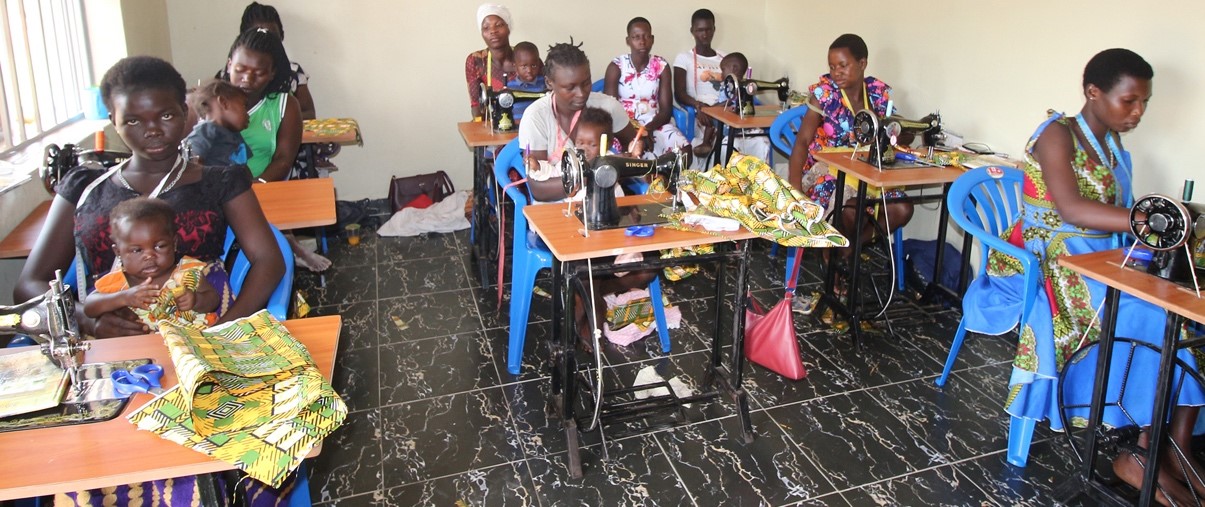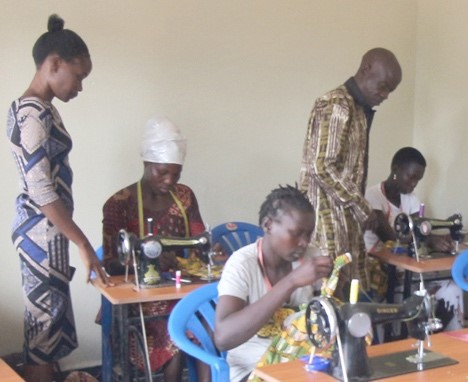Health and Gender Equity

Equality of opportunity for women and men is affected by both societal traditions and availability of reproductive health knowledge and services. Addressing these has been one of the target missions of Rotary International, and one that we embraced as part of our goals working in eastern African nations.
During the nearly two years schools were closed in Uganda, many school-age girls became pregnant, often due to molestation. As a result, they are often unable to continue their education and thus have limited opportunities to acquire skills that allow independence. Also, many girls’ education is compromised because they are unable to attend school during their monthly menstrual periods due to the cost or lack of available basic feminine hygienic supplies. In one of our partner schools, the girls collectively miss over 1,000 days of lessons each month.
In 2021 Words Into Deeds invited teachers, textile artisans, and vocational counselors and educators in Uganda and South Sudan to form a coalition and address these issues. Working together we designed a Gender Equity – WASH (Water, Sanitation and Hygiene) Program that would help both these groups of young women. A grant submitted to the Ithaca Rotary Club was approved and, augmented by generous donations from Backyard Brands and other donors to Words Into Deeds, $24,000 was raised to move the project from design to implementation. Further details about each of the partners are provided in the following section.
To address the needs of young mothers, a program whereby they could learn skills as seamstresses, gain knowledge of business practices, and learn basic computer applications was designed. In May, 2022, the first group of ten young mothers arrived in Gulu and began 6-months training as seamstresses, augmented by counseling and classes in computer literacy and business practices. The grant supports facilities, materials, meals and transportation expenses for these trainees.


The textile training is under the supervision of Adong Immaculate, founder and director of the Wawoto Kacel Cooperative Society in Gulu, Uganda. An extension facility was renovated, sewing machines purchased, and experienced trainers (shown standing in the picture) hired to provide training in pattern design, materials selection, cutting, sewing, button placement, and other skills the trainees will need to become independent entrepreneurs. An adjacent room serves as the nursery.
Scheduled regularly during this training are personal and career counseling sessions, both as groups and individually, and lessons related to reproductive health. These are led by Ocen Fred Briyan, founder and leader of Concerned Parents Association (CPA) of Gulu. Completing the program are workshops and hands-on lessons about developing business plans and computer skills, with emphasis on financing and communications. These are provided by Olara Geoffrey, also of CPA.
To address the problem of girls being house-bound during their periods, the initial production target for the seamstress trainees is to manufacture reusable feminine hygiene kits. Each kit includes reusable cotton pads, a separate piece to stabilize these to undergarments, and washcloths, all within a cloth bag. They also receive liquid soap produced in Gulu by students at the UNIFAT Primary School and in Rumbek, South Sudan be students at the Abukloi High School.


Soap-making student teams at UNIFAT Primary School (left) and Abikloi High School.
For many girls, having these kits frees them to be full participants in their education and social activities regardless of when their menstrual periods occur.

Girls at the Crested Crane High School in Gulu receiving their hygiene kits. At the right are Immaculate, their teacher, and one of the seamstresses.
As they complete their training, the first group of seamstresses are making plans to form their own cooperative, and expand production to include women’s apparel and student backpacks in addition to the kits. We are working with Adong Immaculate to identify suitable retail space and raise funds to help them launch their independent venture with the goal of enabling them to become self-sustaining within a year. Funds from the current grant and donations are available to support a second set of 10 trainees who will begin in November, 2022, but additional funding will be needed to continue these Gender Equity – WASH training and independent production programs beyond this.
